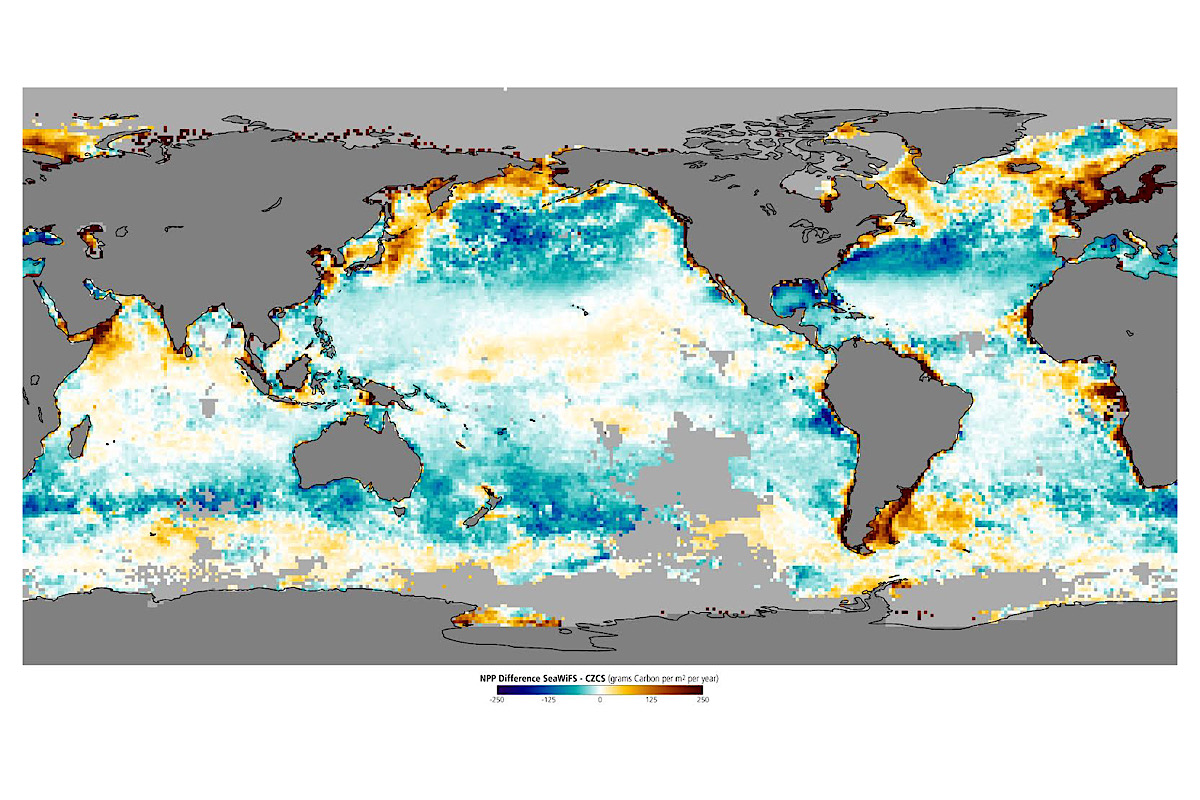Climate costs
As the relentless march of climate change continues to reshape our world, the looming threat to residential property is becoming increasingly apparent.
Satellite records indicate that global ocean annual primary production has declined by more than 6 per cent since the early 1980s.

Changes in marine productivity, [Picture: NASA earth, Observatory]
Plant life covering the surface of the world’s oceans is a vital resource. It helps absorb the worst of the greenhouse gases involved in global warming but is disappearing at a dangerous rate. Satellites and see-going ships have confirmed diminishing productivity of the microscopic plants. The lost productivity of the plant (phytoplankton) is directly due to the increased ocean temperature that has been recorded for the past 20 years.
Satellite records indicate that global ocean annual primary production has declined by more than 6 per cent since the early 1980s. Nearly 70 per cent of the global decadal decline occurred in the high latitudes. In the north and higher latitudes, these reductions are primary production corresponded with increases in sea surface temperature and decreases in atmospheric iron deposition to the oceans.
In the Antarctic the reduction was accompanied by increased wind stress. Three of four lower latitude basins exhibited decadal increases in annual primary production. These results indicate that ocean photosynthetic uptake of carbon may be changed as a result of climatic changes and suggest major implications for the global carbon cycle. This change in the environment has a direct effect on the economy.
Advertisement
We thought the ocean was an inexhaustible source of food And that it would always give more creatures to replace those we removed from it. But today’s ocean is failing to produce fish and the reason Increasingly appears to be an overall decline in marine nutrients. Simple starvation now increasingly limits the growth of fish and other marine life. The size and abundance of commercially targeted fish plunged in recent decades due to the deficiency of available food. Cod, which is one of the most important species for commercial aspects, is reducing in number.
Total productivity can be reduced by significant living biomass removal fishing. Along with the cod crisis, whales and herrings are also declining to create a loss in the economy. North Atlantic cod stocks are totally widely reported to be in a bad shape.
Beyond the well-publicised loss of commercial fish stock, a more disturbing trend is evident which has not been made a focus of attention. This is the loss of multiple small marine animal forms. This is evident to coastal residents who miss seeing what was once common like small fish, eels, snails, clams, mussels, anemones, urchins and starfish Have shown a substantial decline on the shorelines.
Scientific literature records a corresponding decline in Zooplankton’s abundance in the coastal ocean. These downward trends have unexpectedly accompanied the disappearance of the major fish stocks. When considered together this changing picture is strongly suggestive of declining trends in marine primary production or overall ocean fertility. Along with oil spills, marine pollution, and illegal fishing of commercially valuable species all decline marine productivity and create a loss in the economy.
Advertisement